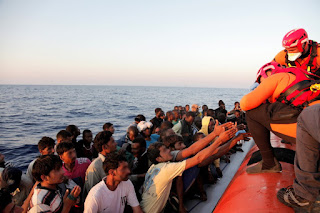The previous Syriza/Anel government collapsed, due to a split in Syriza last month.
As result, the party's leader and Prime Minister Alexis Tsipras was forced to call snap elections.
About 25 rebel Syriza MPs, who objected to Mr Tsipras's acceptance of more austerity demanded by Greece's creditors, formed the Popular Unity party, challenging Tsipras and Syriza. (BBC)
Popular Unity was led by former energy minister Panagiotis Lafazanis, who argues that Greece would be better off leaving the euro and going back to the drachma. (BBC)
Many other high profile Syriza members, like the former Speaker of the Hellenic Parliament-Zoe Konstantopoulou, also joined the rebel party.
Consequently, Syriza went to elections without its most outspoken, anti-austerity and hard-line members; the Popular Unity, plus Yanis Varoufakis who quit previously.
Yet this development did not prevent Syria from winning the elections and Tsipras being reelected as Greece's Prime Minister.
In fact it made his position even stronger. Firstly because the Greek people reinstated Tsipras as their Prime Minister, sending a strong message to Europe that they are giving him another chance.
Secondly, with the more radical Syriza members gone, Tsipras will now face little opposition from within his party.
This is definitely good news, but not only for Tsipras or Syriza. The development offers an opportunity to Greece and Europe, to find a quick solution and bring the indebted country back on track fast.
That of course only if the newly elected government and its European counterparts, actually avoid the previous antics and actually cooperate.
With less opposition from the hard-line anti-austerity members and with a more cooperative Tsipras, Europe must grasp this opportunity to assist Greece and support the new Greek government.
Ending the political instability in Greece, is of the utmost importance to end the economic one too. If Europe continues to torpedo Tsipras' Left-Wing government, then things can only get worse.
The Greek people have once again spoken. Europe must now respect their decision and support their new government, in finding a way out of the economic crisis.
It is in the best interests of both Greece and of course, Europe itself.
Similarly, Syriza should start acting with a more professional and diplomatic manner when dealing with its European partners.
Some of the statements made from previous Greek government officials, were utterly unacceptable and naturally they did not help the negotiation process.
Not that Syriza must totally compromise and abandon its efforts to end, or at least limit the austerity policies. But in the past, we were witnessing a cacophony of opinions from its members, plus a total disrespect of Greece's partners by the Syriza/Anel officials.
But these elections did not bring only positive developments. One of the definitely negative outcomes is that the Far-Right Golden Dawn party, remained the third political force in Greece.
It seems that sadly, they are here to stay for many years to come in the Greek political reality, posing constantly a threat to the country's future.
If for any reason this government collapses again, Golden Dawn could be further empowered and gain more support among the Greek voters; and that will make Greece's economic recovery almost impossible.
The second negative development is that Tsipras is looking to form a new coalition with his old partners, ANEL (Independent Greeks). If the Syriza rebels were not helping the negotiations with their intransigence, ANEL leader Panos Kamenos, has also often made inflammatory comments that had the same effect.
Ideally Tsipras should have been more open to a coalition government with a less hard-line party. Besides he should have learned a lesson; that by aggressive approach to negotiations you can never win support and the argument.
Especially when your party and government officials have a mind of their own, making statements that add oil to the fire. Greece has a justified goal to pursue, but it won't achieve its goals without skillful negotiators and politicians.
The final major negative development that we observed in these Greek elections, was the very low turn-out. About 44 % of Greeks who were eligible to vote did not go to the polls on Sunday.
In real numbers this means that out of 9,836,997 Greeks who could cast their ballot approximately only 5,562,820 people voted. This is the highest abstention rate in the history of Greek parliamentary elections following the fall of the dictatorship in 1974. (Greek Reporter)
But what would one expect from them? After having voted against austerity and for a party that allegedly promised to end it, yet somehow the same party signed for a third bail-out.
The Greek and European leadership have to realize, that they have a responsibility towards them and all the other nations of the continent. If of course themselves value and truly support democracy.
Europe is losing a generation with high youth unemployment rates and experiences increasing inequality, both among its nations and its people. How do our leaders want to be remembered in the future? We should hope not as those who surrendered our continent to vested interests.








